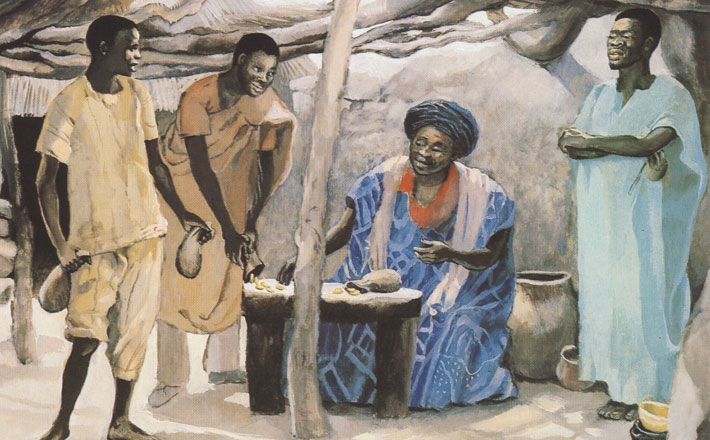Commentary on Psalm 90:1-8 [9-11] 12
In ancient Israel, crisis brought a response of gathering at the holy place under the leadership of priests and other worship leaders.
There the community articulated the crisis in ardent prayer to God to seek God’s help and deliverance. Psalm 90 is such a lament from the community; most commentators place the crisis portrayed in this psalm in the post-exilic community.
In addition to the life setting of crisis, it is important to consider the place of the text in the book of Psalms. It is the only psalm tied to Moses in its superscription and falls at a pivot point in the movement of the whole book. The tie to Moses and texts associated with him recall an earlier time in ancient Israel’s history and this formative character in the community’s story. The psalm begins Book IV of the Hebrew Psalter (Psalms 90-106). Prayers lamenting the destruction of Jerusalem are evident in Book III (Psalms 73-89), and Psalm 89 concludes that section with a powerful plea in the face of God’s rejection of the Davidic covenant and Jerusalem as its seat.
The superscription to Psalm 90 takes readers back to a time before the Davidic monarchy and before the temple to the time of Moses when there was no monarchy or temple and the people were not even in the land promised to them. Still, it was possible in that time to relate to God in prayer. In its literary setting in the book of Psalms, then, Psalm 90 is a kind of response to the problem of exile articulated at the end of Psalm 89.
The lectionary text is the first part of the psalm (verses 1-12) that contrasts God’s permanence with the brevity of human life. The section moves toward lament, giving way to petition in the remainder of the psalm (verses 13-17). We will consider the lectionary text in two parts.
The psalm begins by addressing God and praising God as the community’s dwelling place for generations. “Dwelling place” here carries the sense of a place where one can hide and find help or refuge. Such a home is a divine gift. The creator — the one who was before there was a creation — has given the community refuge throughout the generations. That stability contrasts with the brevity of human life. The poetic imagery is powerful.
God has been present with the faith community and has served as a reliable and strong protector. God’s perspective is the long view of the creator in which a thousand years are like one day or one night. Humans, in contrast, are only like a dream or like grass the morning dew renews only to fade and droop in the evening and so only last a day. Time and its passage are important in these first verses of the psalm. In comparison to the view of the creator, time connotes human frailty and the quick passing of human life. Humans come from dust and return to dust. The contrast between divine permanence and human frailty is central to these opening verses.
The remaining verses in the lectionary text move toward lament. In the context of the precarious human life portrayed in the beginning of the psalm, the community now complains that they have been overpowered by God’s wrath. God sees the people’s sin and the community encounters the oppression of God’s downcast countenance. With verse 9, the theme of the passage of time returns. Human life passes under the cloud of God’s wrath and so the years feel like but a moan or sigh.
Verse ten measures the length of human life as seventy or eighty years at most, and those years are full of trouble and woe. They are gone in the blink of an eye. This moving portrayal of human life in its brevity leads to a plea for wisdom to be able to reflect on life even in its brevity and live it fully. The heart is the seat of wisdom or the will. A wise heart would bring discernment in dealing with the frailty of life confronting persons and communities.
The wisdom here is not so much technique or skill or even information or control. It is rather the ability to acknowledge the creator’s decisive impact on life and so to relinquish life to the creator. It is not unusual for lament psalms to include wisdom teaching as general reflections on life. In Psalm 90, the reflection is on the persistent troubles of life and the plea is for discernment in how to deal with life’s brevity and frailty. Ancient Israel’s experience of exile brought a focus on this dimension of life. The final section of Psalm 90 pleads with God for compassion in the face of such distress.
Psalm 90 takes a full view of life including human frailty and divine wrath and a plea for divine grace. It seems to relate to the specifics of ancient Israel’s experience of exile and the broader human travail. Its hope is to discern the significance of the days humans receive and for divine benevolence in the midst of those days. God is eternal and human life is short.
The center of the psalm is the prayer that God will not overlook such human experience but bring mercy to the congregation consisting of short-lived people. YHWH, our creator and redeemer, is the one who can provide the hope for renewal in life characterized by distress.
Isaac Watts’ 1719 hymn paraphrases Psalm 90:
O God, our help in ages past,
our hope for years to come,
our shelter from the stormy blast
and our eternal home.
Be thou our guard while life shall last,
and our eternal home.
Here is a more contemporary prayer:
You are the memory of where we have been
and the anticipation of where we are going.
Though we are not yet in possession of all we have been promised,
here and there along the way we catch glimpses of our eternal home.
O Lord, you are our home along the way and at the end of the journey.
For traveling with us,
for rescuing us when we are lost,
and for calling us into your holy place,
thanks be to you, O God, our eternal home.1
Notes:
1 Sharlande Sledge, Prayers & Litanies for the Christian Seasons (Macon: Smyth & Helwys, 1999) 31.


November 16, 2014